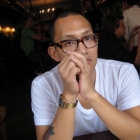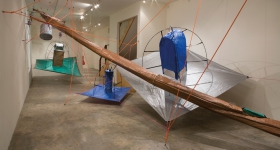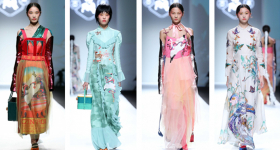The Propeller Group's video installation in New York City's New Museum is deceptively approachable. The five televisions, arranged in a circle and all facing inward, show a five-channel video, and viewers almost instinctively move to stand in the middle of the circle. On the screens, five different perspectives of an office meeting are displayed. Cameras arranged around the conference table capture every expression and exchange. The meeting attendees sometimes laugh, sometimes argue. But mostly they look bored.
This looks like any other office scene -- which is remarkable only if you think about it, because what's being discussed around that table is how to rebrand communism.
The Propeller Group is an art collective out of Sai Gon and Los Angeles, and consists of Matt Lucero, Tuan Andrew Nguyen, and Phunam. Their video installation is one of dozens of art pieces at the museum's Triennial, an exhibition of young and rising artists from around the world. Most of the artists were born between 1975 and 1985. This year's Triennial is themed 'The Ungovernables,' and the title is much a tribute to the unruly nature of this generation of artists, as it is a nod to the political (or apolitical) themes of the art itself. The exhibition is "about the urgencies of a generation who came of age after the independence and revolutionary movements of the 1960s and 1970s." For The Propeller Group, this means uncovering the connections between two seemingly polar opposites: communism, and advertising.
I meet them at the New Museum's cafe and, despite the incessant buzz of visitor foot traffic and jittery museum staff, Lucera and Nguyen are easy and relaxed. Indeed, these guys are probably used to stress. For artists in Viet Nam, scrutiny is nothing new.
Aside from their artwork, the group also runs San Art, one of the few art spaces in Sai Gon. Tuan explains, "The political climate is rigid and tense. So for artists who do the kind of work we do, and run the kind of spaces we run, we're always faced with problems like censorship, not being able to show work."
Matt, who joined the group in 2008 (Phunam and Tuan hooked up in 2006), chimes in, "It's a very tough climate to be in, especially with young artists that want to produce work and are thinking about new ideas and are having a hard time expressing themselves and don't have a place to show their work and don't even have a space to really have a dialogue about it."
So why work in Viet Nam if it's so tough?
Matt is quick to answer. "Without those spaces, there would be no spaces for that dialogue to happen."
The idea of dialogue and mediated experience is big in their work. Another of the group's works, titled "Vietnam: The World Tour" is an attempt "to re-associate a historically colonized and mediated national identity with an entirely new mediated history." In other words, they aim to change how Viet Nam (or any country) is perceived by changing the terms and language that mediate perception.
I ask them about the Diaspora, because you can't talk about Viet Nam
without the Diaspora. And because you can't talk about Vietnamese
communism without the Vietnamese Diaspora. I ask if they've ever shown
their work to these communities.
Tuan finally shows some nerves. "We haven't really shown our work in that context."
"But we've talked about it," Matt finishes.
Tuan
tries to find some footing: "Yeah. Yeah. You know, I think we're
sometimes a even more scared to show our work in that context than to
show our work in Viet Nam. It's crazy. We're not trying to disregard the
history because we're all part of that history. The history of the
Diaspora. The history of loss."
He pauses. "I don't know how to respond to this one."
Matt
continues, "I feel it's a very emotionally tied response that some
people might have. When you just say the word 'communism' it [denotes] a
lot of really heavy things. It might be very personal. And I feel that
it's very difficult to get around that. Especially when it affects your
immediate surroundings, your family, yourself. I don't think we're
trying to instigate those moments but I do think we're interested in the
larger context of things and how myths are formed and how certain
ideologies are formed --"
Tuan interrupts, "--and how so complex,
the different layers and levels and relationships that happen in the
midst of all this." They relate a story of a particular, Cuban American colleague who had expressed interest in producing the full scale commercial. But after learning more about the project and viewing the piece, the backer suddenly had doubts. This exact, personal reaction, that The Propeller Group's work iss so intent on exploring, now complicated the work itself, along with its chances of being furthered.
Despite efforts
by the collective to clarify their position, the colleague backed out.

I ask them about the piece itself. Why focus on advertising?
"I think the economic climate [of Viet Nam] is exciting. Things are
developing, business is developing, a lot of different international
[manufacturers and] advertising companies are moving to Viet Nam," says
Tuan.
"Living in Viet Nam, you're living in the face of constant contradictions. It's still a communist country. But it's very capitalist in many ways. But if offers the chance to see how these binary political approaches coexist together. So we decided it would be interesting if we pushed it even more. What if we could get one of the world's most famous advertising companies -- TBWA, they do Apple they do all these big brands -- why don't we get them to rebrand communism. On a negative level, it seems that communism is on its last leg. But we drive around Viet Nam all the time and we see really old, outdated propoganda. So we thought, "[The government has] all this access to all these advertising companies. What if they just paid them to give [communism] a face lift?"
Matt adds, "It's interesting thinking on a bigger picture how nations are depicted, how they depict themselves in the media and how they are able to engage in this media landscape by hiring an agency and rebranding themselves ... I've never been to a socialist country. So I have all these preconceived notions. I go to Viet Nam. I arrive at the airport. I see the hammer and sickle, the red flag, the star. I go through, I see Ho Chi Minh propaganda, all this stuff. AK-47s, very militaristic. And then [I] get to the center of the city and I see Louis Vuitton, Kenneth Cole, and KFC and Coffee Bean and you name it. All these multinational global companies are there. So I took a step back because I wasn't sure ... what socialism even meant in a country like Viet Nam now in this globalist world economy. I mean it shifted all these definitions for me."
But why focus on the the process? The actual meeting itself?
Tuan explains that the tissue sessions -- the freeform spitballing sessions meant to generate ideas for an ad campaign -- "are everything, it's the brain storm session. It's the creatives, the executive creative director, the director sitting down, throwing ideas back and forth, challenging each other, critiquing each other, questioning each other, presenting their own very subjective knowledge of things. 'What is communism? Wait, wait, it's like this.' And then someone else would be, 'No no, it's like this, but is it not like this?' And that, those moments, are precious, because it's a very subjective experience. But even that subjective experience is mediated...Advertising colonizes your mental space for a little bit. And I think that kind of history and that kind of power is crazy. This is what we're trying to explore."
***
Meanwhile, back at the installation, the brain-child of the tissue session is proving a bit underwhelming, considering the high-powered ad agency that birthed it. The animatic, a rough video sketch meant to illustrate what the ad will eventually be should it be fully produced, consists of a young girl going about town, performing little good deeds and collecting colorful "C"s in return. Eventually she distributes the C's to form a colorful star logo. It's the communist star, now in sugary Olympic flavor.
It seems strange that an idea as nebulous and archaic like communism could still elicit such varying reactions. For some the reaction is strong enough to, say, cancel support for an art project. For others, perhaps more removed from the subject matter, communism inspires cheesy TV ads. But this is precisely the point that The Propeller Group is interested in -- how do ideas get in our heads and, once they've erected tents and "colonized" our mental selves, how do they guide our guts, hearts, and actions?
And yet, of course, there are always other reactions Matt, Tuan, and Phunam have to worry about. Could there be repercussions for showing your work here in the States, I ask?
Tuan is cool and matter-of-fact. "There could be."











Comments
Thanks LTE.
I think the Propeller Group is less interested in really trying to rebrand communism, as they are interested in the idea that such a concept can be "rebranded" at all. To your point, it's interesting to see how a vast ideology (communism, capitalism, what have you) can and is "cherry picked" by the powers that be. Perhaps then communism is being rebranded already.